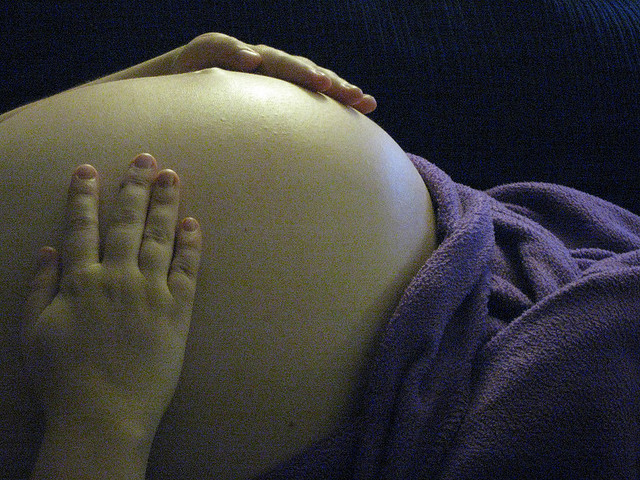*Editor’s Note: This website is not designed to, and should not be construed to, provide medical advice, professional diagnosis, opinion or treatment to you or any other individual, and is not intended as a substitute for medical or professional care and treatment.
When it comes to fertility and conception, nutrition is of the utmost importance.
In order to get pregnant (and stay pregnant), there must be sufficient nutrient levels for your body to be able to create and sustain new life, which is a whole lot of nutrients! This applies to both the woman and the man.
The man’s sperm is 50% of the genetic contribution to the baby, so it is to the couple’s advantage for both people to eat as healthy as possible. This goes a long way, not only for success with conception, but also to create the healthiest baby possible.
Of course, this is only one factor of many that contributes to fertility and health, but it is one that counts for a lot. It matters what you put in your body before, during and after pregnancy.
Here are the top five things for you (and your partner) to put in your bodies when you’re trying to make a baby.
1. Water
Hydration levels are very important when it comes to fertility for a number of reasons. Firstly, the pH balance of both the man and the woman significantly affects the quality of environment in the reproductive organs. If one is too basic or too acidic when trying to conceive, it simply does not work.
Secondly, if a woman is properly hydrated, she has a better chance of producing better quality cervical mucous (this is the awesome stuff that appears in the vagina leading up to ovulation, which plays many roles, including guiding the sperm to the egg). If a man is properly hydrated, the seminal fluid (the stuff the sperm travels in) will be of better quality and will help the swim team have more stamina.
It is recommended that women and men trying to conceive drink six eight-ounce glasses of water per day.
2. Healthy Fats
Healthy fats are needed by the body for hormone production and tissue creation, which are extremely important in conception and fertility. If you or your partner are accustomed to eating a low fat diet, it is recommended that healthy fats be added back into meals in order to maximize chances of getting pregnant.
It is, however, important to choose the types of fats to consume wisely. A study published by Oxford University found that men who consumed high levels of trans fats experienced increased negative effects on sperm quantity and quality. Men who consumed more healthy fats (for example Omega 3 fats) experienced positive changes in the quality and functionality of sperm.
In a long term study conducted by Harvard University, it was found that women who consumed trans fats regularly could be up to 70% less likely to get pregnant than women who did not.
Examples of healthy choices of fats include: olive oil, avocados, nuts and seeds, coconut oil, butter, eggs, ethically produced and organically raised meats and moderate amounts of full fat, organic dairy.
Here’s another tip: if you eat a diet which only contains whole, unprocessed, natural foods (like the foods your grandparents would recognize as foods) trans fats are not likely to be of concern.
3. Zinc
Many people know of zinc as a men’s nutritional supplement. They say “zinc for the dink” for a reason! But zinc plays a role in both male and female reproductive function.
It is a component of healthy follicular fluid and ensures proper processing of estrogen and progesterone. It aids in producing quality eggs and is essential for proper cell division and growth in a fetus.
Zinc is found in high concentration in the male reproductive organs and sperm. It plays a role in the maturation and development of healthy sperm such as proper formation of the tail and outer membrane of sperm cells.
You can read more about the wonders of Zinc and reproduction in my article, “On Sex, Fertility and Oysters” both of which are an excellent source of zinc.
Here are some more sources: eggs, whole grains, nuts and seeds, cheddar and Parmesan cheese, other shellfish, sardines and poultry.
4. Foods to build iron stores
Iron is a major player in conception and reproductive health in general (especially for women). DNA replication is strongly influenced by iron as is the production of blood. Deficiency in iron has been shown in many studies to increase the likelihood of preterm birth. Studies have also shown that women who get sufficient iron can decrease their chances of ovulatory infertility by as much as 50 percent.
Great sources of iron include: red meat, poultry, beans, tofu, fish, leafy greens, eggs, seeds (especially pumpkin seeds) and oats.
5. Foods Rich in Vitamin C
The benefits of Vitamin C in overall health are well known. In regards to fertility and reproductive health, it contributes significantly. Vitamin C is used by the body to produce and regulate hormones.
For the ladies, Vitamin C is a part of healthy ovulation and healthy production of eggs. For the men, it benefits sperm count, motility and morphology. Vitamin C has also been shown to prevent the sperm from clumping together in the woman’s body. This makes things far more free flowing for the swimmers and increases the chance of one of them making it to the egg.
The antioxidant properties of Vitamin C are generally well known. This can help to protect sperm from oxidative damage (which can affect the DNA).
Foods rich in Vitamin C include: Green veggies (especially asparagus and spinach), citrus fruits, alfalfa, grapes, kiwi, mangoes, strawberries, cantaloupe and cherries.

As important as it is to make sure you are getting enough of the right things, it is just as important to consider eliminating the things you put in your body which might negatively affect fertility.
1. Alcohol
Significantly reducing or completely eliminating alcohol intake can significantly increase your chances of getting pregnant, especially if you are a heavy drinker. Alcohol intake affects the pH balance of the body as well as hydration levels. As discussed earlier in the article, both of these factors play a major role in the success of conception.
Another consideration is timing of conception. If a couple is having sex on a regular basis, it is difficult to determine exactly when the woman becomes pregnant. Signs and symptoms of pregnancy can often take weeks to become evident so it is important to acknowledge that if alcohol is consumed until the time the pregnancy is confirmed, the woman is likely to be drinking while pregnant.
The propriety of consuming alcohol while pregnant is a common cause for heated debate. Many cultures have opposing beliefs as do different schools of scientific thought. The decision of the parents of the baby should be respected if it is made of conscious consideration and research. When couples are unsure of what to do, I recommend considering the fact that we cannot really know anything when it comes to these things, even with many studies. My preference is to be cautious and abstain from drinking while pregnant.
2. Smoking (including marijuana)
The risks of smoking tobacco cigarettes while pregnant are widely known. These same principles apply to folks who are trying to conceive. Many of the chemicals found in cigarettes can remain in the body for months, even after the last cigarette is smoked. If you are a cigarette smoker, consider quitting and giving your body a three-month period to detoxify before you begin your conception efforts. This goes for the men, too.
The topic of cannabis (marijuana) is, again, a hot debate at times so I tend to recommend that couples play it safe and abstain during conception and pregnancy.
Many studies have shown that marijuana use negatively effects hormone production, egg quality and ovulatory processes, as well as sperm quality and motility (this mean smokin’ the ganja slows the little guys down).
There are numerous accounts of couples who try to get pregnant for months with no success but as soon as the couple no longer smokes the dope, she gets pregnant. Just some food for thought.
3. Coffee
Ouch! This is a tough one for a lot of people to hear. Coffee (and other caffeine containing products) should be significantly reduced or completely eliminated. Coffee interferes with hydration levels and pH balance in the body—the importance of which has already been discussed. Coffee consumption can create an acidic environment in the vagina (as well as the rest of the body), which is not hospitable to sperm.
Many healthcare providers and doctors state that one cup (eight ounces) of regular coffee per day is acceptable during conception and pregnancy. This is when individual discernment comes into play. If a couple has no trouble getting pregnant and there are no negative side effects observed from the consumption of coffee, then it is likely okay.
But if there is trouble getting pregnant, the couple should be doing everything they can to harmonize and correct imbalances in the body. Hydration levels and pH balance are a great place to start and for this, coffee plays a role. So consider it.
There are many factors that come into play when it comes to conceptions success.
From genetics to emotional health, from environmental factors to stress levels, it all matters. Sometimes these things are difficult to change or control. Nutrition—the things we choose to put in our bodies—is something that we can change and adapt very easily. It goes a long way.
For things which are more complicated and perhaps out of our hands, it can be very helpful to seek guidance from a qualified practitioner. This may be a medical doctor who specializes in fertility or it may be someone who practices natural medicines such as acupuncture and herbal medicine.
Whichever your preference, don’t be afraid to ask for help. You may be surprised at the difference it can make to work with someone.
Lastly, make sure you have lots of fun practicing. This matters too!
Love elephant and want to go steady?
Sign up for our (curated) daily and weekly newsletters!
Apprentice Editor: Kim Haas / Editor: Travis May
Photos: Jaron via Flickr / Quinn Dombrowski via Flickr












Read 0 comments and reply